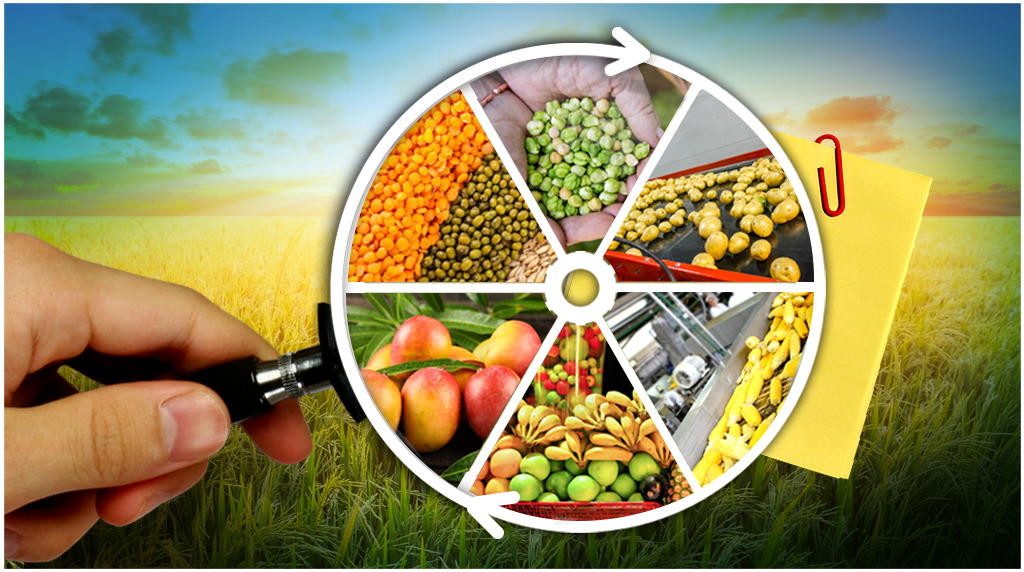The Indian Govt. has placed a strong impetus on the food and Agri sector and aims to double the income of farmers by 2022.

- Pradhan Mantri Fasal Bima Yojana (PMFBY):
Launched in 2016, the scheme provides financial support to farmers and cover their crop losses. The scheme covers rabi, Kharif crops as well as annual horticultural and commercial crops. PMFBY is a crop insurance policy and premium payable on the principal amount to the farmers.
- Pradhan Mantri Krishi Sinchayee Yojana (PMKSY):
Under the scheme, allocation of USD7.64 billion has been made for investment in irrigation, expanding cultivable areas, improve the efficiency of on-farm water to reduce wastage, enhance the adoption of precision irrigation, etc.
- Paramparagat Krishi Vikas Yojana (PKVY):
The scheme ensures the promotion of organic farming and the balanced use of chemical fertilizers and enhances the quality of farm produce.
- Agricultural Technology Management Agency (ATMA):
This technique facilitates retrieval of data and data entry from the internet-based web portals without having the internet by using a simple mobile phone. More than a dozen of services of innovative technology like USSD are being operationalized for farmers and other stakeholders.
- Foreign Direct Investment (FDI)
- 100% FDI is permitted under the automatic route in food processing industries
- 100% FDI is allowed through Government Approval route for trading (including e-commerce) in respect of food products manufactured in India
- 100% FDI is allowed for companies undertaking Single Brand Retail Trading in India (49% under Automatic route and approval route for beyond 49%)
- Up to 51% FDI is permitted under the approval route for Multi-Brand Retail Trading with a condition that the minimum amount to be brought in as FDI would be USD 100 million and 50% of this amount to be invested in back-end infrastructure.
- The foreign capital invested in India is generally allowed to be repatriated after payment of taxes due, except in cases where the sectoral or other conditions specifically mentions non-repatriation. The repatriation is governed by the Foreign Exchange Management (Current Account Transaction) Rules, 2000, as amended from time to time.
- Pradhan Mantri Kisan SAMPADA Yojana: Government of India has approved a new Central Sector scheme – PM Kisan SAMPADA (Scheme for Agro Marine Processing and Development of Agro-Processing Clusters) with an outlay of ` 6000 crores for the period 2016-20 co-terminus with the 14th Finance Commission cycle. The scheme will be implemented by the Ministry of Food Processing Industries, GoI New Delhi.
- SAMPADA is the comprehensive package aimed at the creation of modern infrastructure from farm gate to retail outlet. The scheme consists of the following sub-schemes:
- Mega Food Parks
- Integrated cold chain and preservation infrastructure
- Creation/expansion of food processing and preservation capacities
- Infrastructure for agro-processing clusters
- Creation of backward and forward linkages
- Food safety and quality assurance infrastructure
- Human resources and institutions
The details are available in the link
http://mofpi.nic.in/sites/default/files/important_noticesampada-19.05.2017_0.pdf
- Mission for Integrated Development of Horticulture (MIDH): MIDH has been launched by Ministry of Agriculture, GoI by subsuming various existing schemes such as National Horticulture Mission (NHM), Horticulture Mission for North East & Himalayan States (HMNEH), National Bamboo Mission (NBM), National Horticulture Board (NHB), Coconut Development Board (CDB) & Central Institute for Horticulture (CIH). The subsidy for postharvest management and cold chain projects implemented through NHM and NHB are also part of the MIDH.
Details of the scheme can be obtained from the link http://www.midh.gov.in/PDF/MIDH_GL(E).pdf
- Paramparagat Krishi Vikas Yojana:
The government has launched Paramparagat Krishi Vikas Yojana in order to address the critical importance of soil and water for improving agricultural production. The government would support and improve organic farming practices prevalent in India. Following the cluster approach mode of farming, at least 50 farmers would form a group having 50 acres of land to implement organic farming. The government aims to cover 10,000 clusters and five lakh hectares of arable land under organic farming within three years.
Why Prefer Meticulous Business Plans?
The world is becoming highly digitalized and reports play a crucial role in especially setting a vibrant, innovative and potential business unit. Our reports are designed in the most efficient way that suits the work style of all range of Enterprises and Entrepreneurs. Our well-planned resources and strategies are solely responsible for the success we had for the past few years.
We have developed the Report formats And Reports with the help of a knowledgeable and experienced team. We ease the clients by offering syndicate & customizable reports as per the requirement.
If you are seeking help to understand how the business runs, we are just a mail or call away.

Fantastic information. I am working as Advisor, Entrepreneurship Development Cell, Shegaon. I want to market Meticul;as Busijness Plan. What is the procedure & details.
Dear Mitharam,
Connect with our expert at info@meticulousbplans.com or share your contact details to +91 997 088 7772
Meanwhile, visit – https://www.youtube.com/channel/UCBTRuuBnWXw7w3T-twpmppA
Regards,
Meticulous B-Plans